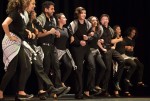Growing up in Saudi Arabia, Jodutt Basrawi was not interested in learning about his Arab heritage.
But after visiting family in Syria in 2011 – at the beginning a series of protests and revolutions in the Middle East called the Arab Spring – the second-year geology student became passionate his Arab identity.
Basrawi and other members of the United Arab Society held and their annual culture night on Friday in an effort to stay connected to their culture and educate others about the conflicts in the Arab world.
The society was founded in 2000 and aims to reflect the collective Arab voice at UCLA, creating a sense of community for Arab students, Basrawi said.
At the culture night, students collected donations for the Syrian Sunrise Foundation, a charity that donates money to Syrian refugees in need of medical supplies, food and other basic necessities.
In the past five years, more than 100,000 people have been killed and about 4 million have been displaced as a result of the protests and revolutions in the Middle East, according to The New York Times.
“This is something that hits close to home. The majority of the board is Syrian,” Omar Issa Attar, a second-year computer science student, said. “That’s why we focused on that.”
Issa Attar was born in Syria and came to the United States when he was 6 years old. He said he has family members in Syria who were there when the revolution started.
On Friday, the group aimed to benefit their cause through a series of performances including two comedians from the Sultans of Satire of the Levantine Cultural Center, a nonprofit organization that presents artistic and educational programs in Los Angeles. One of the comedians cracked jokes about Arab stereotypes and her personal experience being Egyptian living in Ohio and New York City.
The tone of the performances shifted as the night went on, as the lights dimmed and students dressed in black and wearing the traditional Arab hattah, or headdress, entered the stage.
Students in the LA Dabke Troupe student group, including Basrawi, danced with intricate footwork, rhythmically stomping to the Arab music while audience members clapped along. Dabke is a Middle Eastern folk dance that originates in the eastern Mediterranean, or Levant, Issa Attar said.
The show also included a group of ethnomusicology students called Takht Dirty, who played classical Arab music with instruments such as the oud and the tabla drum.
For Basrawi, the event was a way to simultaneously support refugees and celebrate his culture, showing an optimistic side to current events.
“Being a part of the culture night and (the United Arab Society) is a little hub to remind myself of my culture,” Basrawi said. “To see Arabs 1,000 miles away from home is extremely invigorating.”
Youmun Alhlou, a third-year international development studies student and the director of the culture show, said this year’s culture night is important to her because the donations to the Syrian Sunrise Foundation have a personal connection.
Alhlou’s parents are Syrian immigrants who came to the United States when they were 18 years old, she said.
Her grandmother, who is disabled, and her aunt, are both refugees.
She said she used to visit her family members in Syria every summer, but her relatives have moved to different places across the world. Now, it is harder for her family to reunite every year.
“(My parents) told me I should be proud of my Arab heritage,” Alhlou said. “(The culture night) is a way for me to be able to express my heritage conjoined with my American identity.”
